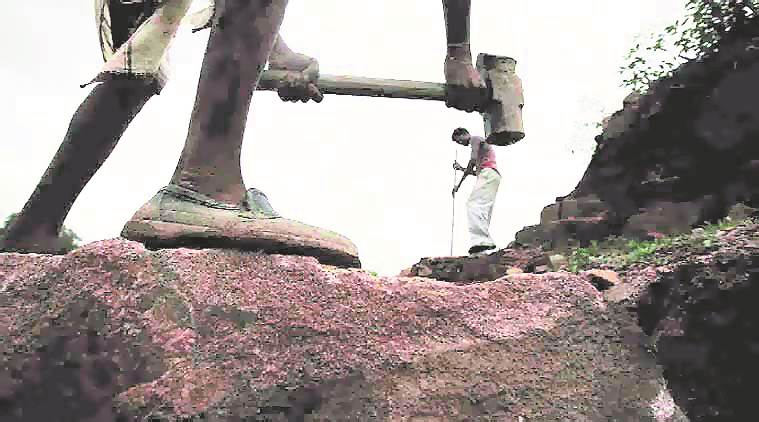A lifeline, interrupted
.
 There are prominent ways in which it is evident that the government is prioritising saving at the cost of its poorest people — a breach of the law and the Constitution.
There are prominent ways in which it is evident that the government is prioritising saving at the cost of its poorest people — a breach of the law and the Constitution.
Rambeti from Sitapur, Uttar Pradesh, graphically described the predicament of MGNREGA workers like her in a recent press conference in Delhi. “The government repeatedly states that it will not let us die of starvation. But the truth is, it does not allow us to live either.” That is a terrible evaluation of MGNREGA — a landmark legislation enacted to protect the right to life, dignity of labour and build permanent assets for the rural poor.
There are prominent ways in which it is evident that the government is prioritising saving at the cost of its poorest people — a breach of the law and the Constitution.
In 2017, more than 80 per cent of the budgetary allocation was spent in the first four months. The ministry of rural development’s (MoRD) request for an additional Rs 17,000 crore has so far been ignored. Currently, with only about 5 per cent of the allocation remaining, there is a sharp rationing of expenditure and work. Liabilities for work already completed mount on a daily basis. There are states where the central government has failed to clear wages for over two months.
In 1983, in Sanjit Roy v. the State of Rajasthan the Supreme Court stated, “where a person provides labour or service to another for remuneration which is less than the minimum wage, the labour or service provided by him clearly falls within the meaning of the words ‘forced labour’. if anything less than the minimum wage is paid to him, he can complain of violation of his fundamental right under Article 23 and ask the Court to direct payment of the minimum wage to him…”
There are now at least 14 states where the state MGNREGA wage is less than the minimum wage. The Mahendra Dev Committee set up by UPA 2 unequivocally stated that “The baseline for MGNREGA wage indexation from 2014 may be the current minimum wage rate for unskilled agricultural labourers fixed by the States under the Minimum Wages Act or the current MGNREGA wage rate, whichever is higher”. The Modi government set up another committee, this time headed by the additional secretary, MoRD, which concludes: “In (the) Committee’s opinion, there is no compelling argument for convergence of minimum wages for agricultural labour and wages notified for NREGA workers in view of the differences in activities performed by these two set of workers”. Clearly, the law, the SC, and workers’ fundamental rights are not compelling concerns.
As a part of a judgment in an ongoing case in the SC, Justice Lokur and Ramana built upon the Sanjit Roy judgment and stated: “It is quite clear, therefore, that when the rights of tens of thousands of people are affected by delayed payment of their legitimate dues, there is a clear constitutional breach committed by the State — be it the Government of India or a State Government.” Commenting on the deliberate circumvention of the payment of compensation for delay, the SC stated, “We are quite pained to note that the Government of India has made no provision for this compensation while releasing the wages for 2015-16. This is extremely unfortunate and certainly does not behove a welfare state in any situation, more so in a drought situation. Social justice has been thrown out of the window by the government.”
A recent independent study by three social scientists in two phases, traces the central government’s conscious delay in wage payments and the deliberate denial of responsibility to pay compensation. Analysing over 90 lakh transactions in the MGNREGA Management Information System (MIS) for 3,446 gram panchayats for FY 2016-17 and 45 lakh transactions in 3,603 gram panchayats in FY 2017-18, it shows that only 32 per cent of payments are being made in time, against the government claim of 85 per cent. In the sample, compensation due is a wilfully under-calculated by 86 per cent. Only about 6.5 per cent of what should be paid as compensation has been paid so far.
The first phase of the study was reviewed internally by the Ministry of Finance, which accepted that “In cases of delays in making large number of payments, it has been found that funds have not been available either of Centre and State shares… It was found that the delay in payment to states was mainly due to infrastructural bottlenecks, availability of funds and lack of administrative compliance.”
The SC’s judgment holding such delays and denial to be forced labour continues to be wilfully circumvented. Little can be said about the dignity of labour in a government where the prime minister mocked the law on the floor of the Lok Sabha.
India’s high levels of rural distress in the last few years can be partially addressed by the MGNREGA — a potential lifeline for rural workers. However, if Rambeti’s voice of anguish is to be attended to, we have to collectively make sure that the dignity of workers is protected. For MGNREGA workers to state that they are going through “a living death” is the most disturbing judgement that can be delivered.
December 8, 2017 at 4:41 pm
The government should give due importance to MNREGA scheme and poor workers in the country